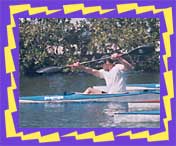|
|
Olympic Competitor's Shocking Story
When the jackhammer dug into the power lines, the electricity shot through Cliff. It traveled instantly through his whole body, burning him as it went. It exploded out the back of Cliff's head, out through his shoulder, and through his foot, taking two toes with it. Cliff's heart stopped immediately, but a firefighter did CPR (cardio-pulmonary resuscitation) and revived him. His heart stopped twice more in the ambulance on the way to the hospital, but still Cliff survived. He spent the next several months in the hospital while his body healed from the terrible burns. "One-third of both my knee joints was burned away," says Cliff. "I had such extensive injuries that the doctors said they would have to amputate my legs." Fortunately, one doctor was able to save his legs with a special operation. Cliff left the hospital in a wheelchair and began the long process of rehabilitation, which included many, many surgeries. Before his accident, Cliff had been a runner. "I was heartbroken because they said I wouldn't walk again. I finally had to admit that I couldn't be a runner." But Cliff didn't give up. He worked hard to build his strength and eventually was able to walk, though he has to wear heavy braces on his legs.
"The accident changed the person I am. It made me a stronger person mentally and physically. I don't think I would have had the will and determination to make it to the Olympics without going through an experience like this," Cliff says. "But I have enormous physical limitations. The damage is done, and there's no coming back from that." Cliff learned from his experience that knowing how to be safe around electricity can help people avoid electrical accidents like his. "Avoiding accidents has a lot to do with preparing ahead of time," Cliff explains, "just like winning at a sport has a lot to do with training and having a strategic plan before you do the race." What's Your Story?Do you know someone who has been in an electrical accident or has had an electric shock? Interview that person and tell his or her story.
Do you have an electric shock story of your own to tell? Answer these questions about your own electric shock. You could also find a newspaper article about someone who was injured in an electrical accident. Write an article about your interview, your experience, or the newspaper story you read. Tell the story in an oral report to your class or discuss it with a partner. Lead a discussion about what could have been done to prevent the accident. |

 In
November 1986, while using a jackhammer to break up a
concrete slab Cliff Meidl received a severe electric shock.
He did not know that power lines carrying thousands of volts
of electricity were buried in the concrete.
In
November 1986, while using a jackhammer to break up a
concrete slab Cliff Meidl received a severe electric shock.
He did not know that power lines carrying thousands of volts
of electricity were buried in the concrete. As
part of his rehabilitation, Cliff began to canoe and kayak.
Because of his hard work and determination, he became one of
the best kayakers in the world. He competed at the 1996
Olympic Games in Atlanta, Georgia, and represented the
United States again at the 2000 Olympics in Sydney,
Australia.
As
part of his rehabilitation, Cliff began to canoe and kayak.
Because of his hard work and determination, he became one of
the best kayakers in the world. He competed at the 1996
Olympic Games in Atlanta, Georgia, and represented the
United States again at the 2000 Olympics in Sydney,
Australia.